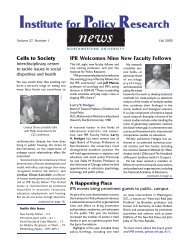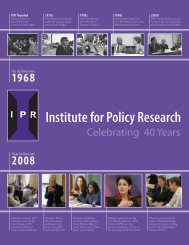pdf - Institute for Policy Research - Northwestern University
pdf - Institute for Policy Research - Northwestern University
pdf - Institute for Policy Research - Northwestern University
You also want an ePaper? Increase the reach of your titles
YUMPU automatically turns print PDFs into web optimized ePapers that Google loves.
P. Reese<br />
schedules of federal population censuses<br />
shortly after their birth, economist Joseph<br />
Ferrie can assess the effect of early life<br />
circumstances on later life outcomes in<br />
the United States. This will provide a<br />
more accurate projection of the longevity<br />
and late-life health of Americans entering<br />
their mid-70s. Ferrie with Karen Rolf of<br />
the <strong>University</strong> of Nebraska at Omaha<br />
and Werner Troesken of the <strong>University</strong><br />
of Pittsburgh followed 40,000 individuals<br />
born between 1900 and 1930. They<br />
find that individual, household, and<br />
community-level influ-ences all had<br />
substantial effects on a person’s life<br />
expectancy. For example, those born in<br />
1918 during the influenza pandemic of<br />
1918-19 lived two years less than those<br />
born in 1915. They find those born in<br />
the second (April to June) and third<br />
(July to September) quarters of the year<br />
have shorter lifespans, and they continue<br />
to study the reasons behind this. Also,<br />
household variables—either genetic or<br />
environmental—have a large impact on<br />
lifespans, and parental characteristics such<br />
as education levels and occupation have<br />
little impact on longevity.<br />
HIV/AIDS<br />
<strong>Research</strong>ers are increasingly documenting<br />
the social context of infection risk and the<br />
ways in which systems of inequality result<br />
in disproportionate infection rates among<br />
disadvantaged groups. However, little is<br />
known about the everyday experiences of<br />
those infected and how socioeconomic<br />
factors shape their experiences. In an<br />
ethnographic study of African American<br />
women infected with HIV/ AIDS in<br />
Chicago, sociologist Celeste Watkins-<br />
Hayes is exploring how work, family<br />
dynamics, social support networks, and<br />
intimate relationships affect infected<br />
black women. The study seeks to define<br />
how HIV/AIDS impacts their daily<br />
living, life chances, and social outcomes.<br />
Currently in the data analysis stage, the<br />
study is funded through the Center <strong>for</strong><br />
AIDS Prevention Studies’ Collaborative<br />
HIV-Prevention <strong>Research</strong> in Minority<br />
Communities Program, <strong>University</strong> of<br />
Cali<strong>for</strong>nia, San Francisco.<br />
Law professor Dorothy Roberts continues<br />
her work on gender, sexuality, and implications<br />
<strong>for</strong> HIV/AIDS in the Caribbean.<br />
She is co-editing a volume of papers with<br />
Rhoda Reddock of the <strong>University</strong> of the<br />
West Indies that were presented at a<br />
symposium on the topic. The research,<br />
started while she was a Fulbright scholar<br />
in Trinidad and Tobago, is part of a<br />
comprehensive research initiative to<br />
investigate how gender norms, expectations,<br />
behaviors, and associated power relations<br />
influence sexuality, in addition to the<br />
implications <strong>for</strong> HIV/AIDS risk and<br />
prevention in the Carribbean. Roberts is<br />
Kirkland and Ellis Professor of Law.<br />
Peer Effects<br />
Economist Greg Duncan<br />
continues his body of work looking<br />
at peer empathy. In previous<br />
work, he has found that having a<br />
college roommate from a different<br />
socioeconomic group makes<br />
one more empathetic to that<br />
particular socioeconomic group,<br />
and college males who binge drank<br />
in high school drank much more<br />
in college if they roomed with<br />
another binge drinker. Duncan and<br />
Guang Guo of the <strong>University</strong> of<br />
North Carolina, Chapel Hill have<br />
received funding <strong>for</strong> a replication<br />
study at a second major public Celeste Watkins-Hayes discusses<br />
university. It will focus on the her research on HIV/AIDS and<br />
effects of racial and class diversity African American women.<br />
on attitudes and behaviors and of<br />
problem-drinking behavior. Duncan and<br />
Guo will also employ a novel approach<br />
to gather DNA and data exploring geneenvironment<br />
interactions between certain<br />
dopamine transporter genes and a random<br />
assignment to a freshman roommate with a<br />
drinking history.<br />
www.northwestern.edu/ipr 21
















